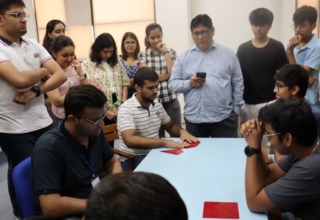
The final phase of CUET (Common University Entrance Test) 2022 is underway with constituent universities and their affiliated colleges admitting undergraduate (UG) students. Delhi University (DU), the largest central university in India with about 70,000 seats and 67 colleges, has almost completed the admissions through Common Seat Allocation System (CSAS) and so are other 200 universities in the final stages of concluding the admission process that began with the announcement of CUET in March 2022.
Tech platform, Samarth eGov operating from DU’s south campus has almost revolutionized admission process in HEIs in India and this is just the beginning. The technological success of automating college admissions, has stepped up the confidence level in the establishment and there is already talks of holding CUET twice to make it more student-friendly. India is on verge of a transition to a simplified admission regimen and like CAT, CUET scores will become nationally acceptable in all institutions offering undergraduate programmes in near future. It will of course free lot of resources and time as technologies continue to become better and overcome various challenges in course of applications.
The CUET 2022 with its teething and testing problems wasn’t altogether pleasant for student aspirants. After two board examinations, then students had to sit for CUET with shaky confidence as the complicacies and psychological pressures of a new system had its share of breakdowns and delays. CUET roll out delayed academic session by almost two months this year and DU has already indicated, it will make up by cancelling summer vacations. So, students who enroll in UG courses this year, will continue to feel the heat of studying too fast and under pressure if the past two years of disrupted classrooms was not enough.
Before getting into an apparent analysis to assess if the CUET indeed set free the higher education dream of students from marks and despairing cut-offs, it is also necessary to get a glimpse of the adaptation pattern by student and parents that has emerged in the past several years. Khushi (name changed) not sure if she will get college and subjects of her choice, sought admission in a private university in August, almost 300 km from her home. The only child of her parents, she got extra attention from her middleclass parents, as they didn’t want to comprise with her interest and education. Despite their obvious hesitation and not wanting their daughter to go out of hometown, they obliged and completed her admission process and arranged hostel (PG) for her. To their relief now, Khushi has cracked a CUET seat and she is being brought back after foregoing the fees etc.
Her friend all these months pulled all resources and is headed to a foreign university in Australia. He was convinced, he won’t be able to get through the fierce competition here and therefore, he planned it that way quite early for months. While going aboard for foreign universities has been a popular trend for many years now, a large number of students and parents are compelled to walk that path due to lack of opportunities in popular streams here in India. Humanities and commerce, once a throw away available choice locally has gone the STEM way in recent years with reputed colleges having high cut offs. So, students have to move out to lesser known and newer places for study within the county and abroad.
While humanities is receiving attention from a large number of students chiefly because of it offering a breaking point with years of STEM pressurized study for them besides some demonstrated distinct and lucrative career paths, private universities too have contributed to this trend by indulging in smart marketing and hard selling. The students who post-secondary education, are naturally looking forward to a college experience, however, are not that lucky in this matrix.
Khushi cited above after coming back and seeing classroom of her new public college is disappointed. Not great classroom furniture, AC or aesthetically modern looking seating? The new place is also crowded in her view. The university she had joined looked modern and trendy in some sense? Only in coming months, will she realize that real campus life is here as she prepares for life in the hustle and bustle of academics and co-curricular marathons. While she will be lucky to learn life closely with a lot friends and ecosystem in next three years, not many of her ilk will be that lucky. The Ashokas, The Rishihoods, the Jindals of Sonepat and the institutions in their class elsewhere, more of boarding school extensions, from Uttarakhand to Punjab, Gujarat, Maharastra, Andhra and Tamil Nadu, will continue to grow in a make-belief and limited world.
CUET is definitely a good reform, which hopefully will get and play better next year onwards. At the same time, the big picture still reminds of the struggles students and parents have to undergo to get a seat in our HEIs. Creating more capacity that is affordable and offering quality with student life is still a fundamental dream reform if higher GER in higher education has to be realized and youth of the country are to be empowered with their full potential. The Government needs to increase spending across the board from infra to faculty development and better amenities in tier 2 and tier 3 cities. Coming back to the question of CUET, if it has buckled the cut-offs, remains to be answered fully. As illustrated, it is still the adaptation that is saving the situation as of now. The full-extent will be known once, out of college numbers and their stories come out. The higher education capacity remains the challenge before the country.










